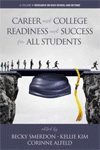
Career and College Readiness and Success for All Students
Edited by:
Becky Smerdon, Quill Research Associates, LLC
Kellie Kim, WestEd
Corinne Alfeld, Institute of Education Sciences
A volume in the series: Research on High School and Beyond. Editor(s): Becky Smerdon, Quill Research Associates, LLC. Kathryn M. Borman, University of South Florida.
Published 2018
Most Americans no longer question whether and which students should be prepared for college. Rather, it is now widely accepted that ALL students should be prepared for postsecondary education in some form (e.g., certificate, 2- or 4-year degree), as these credentials are not only required for many jobs but are also the surest path to upward mobility (Carnevale, Rose, Cheah, 2011). There is also greater recognition that in addition to a more traditional approach to preparation for postsecondary education (e.g., taking college preparatory classes), students should also graduate high school with technical knowledge and employability skills to secure, retain, and advance their employment when they leave school, at whatever level that may be. Simply put, today’s high school graduates need a broad-based education that combines an array of knowledge, skills, and experiences to prepare them for life after high school. And indeed, state’s definitions of college and career readiness have broadened in recent years to include a variety of skills and dispositions, such as critical thinking skills, social emotional skills such as collaboration, and interpersonal skills such as resilience and perseverance (English, Rasmussen, Cushing, & Therriault, 2016).
The Every Student Succeeds Act (ESSA) of 2015, the key federal K-12 legislation, explicitly supports the notion of a “well-rounded” student, emphasizing readiness in areas beyond its predecessor’s (the No Child Left Behind Act, or NCLB) focus on core academic content. ESSA mandates that states ensure that students are provided an enriched, accelerated curriculum beyond courses and content areas in which state assessments are given (e.g., mathematics, reading) and that is aligned with the postsecondary experiences students are likely to encounter. ESSA also supports an expansion of readiness goals through provisions for the improvement of conditions for student learning that support social-emotional learning, intrapersonal skills, and other employability skills. And ESSA includes provisions in states’ accountability systems that support emphasis on broader definitions of readiness. Additionally, ESSA’s accountability framework includes important principles for supporting a broader definition of what students need to know and be able to do once they graduate high school. Accountability systems under ESSA may include multiple measures of college and career readiness. Indeed, several states had already added a career-focused indicator prior to ESSA passing (such as pathway completion or technical assessment achievement) to their accountability systems, and the number of states publicly reporting such indicators continues to increase (Achieve & AdvanceCTE, 2016).
As definitions and measures of college and career readiness continue to evolve, we know one thing for sure: we need to better prepare ALL students for success after high school. This book explores the ways in which some education researchers are approaching this task.
This was written in Corinne Alfeld's official capacity as part of the national conversation on education, is intended to promote the exchange of ideas among researchers and policy makers and to express views as pail of ongoing research and analysis, and is not intended to necessarily reflect the official views of the U.S. Department of Education.
CONTENTS
Introduction. Clearing Clogs in the Pipeline: College Readiness for All in Chicago and Milwaukee, Raquel Farmer-Hinton and Kelly K. Rifelj. Do CCR Initiatives Lead to College and Career Readiness? One State’s Efforts to Meet the Challenge, Jacqueline R. Stillisano, Kim B. Wright, Kayla B. Rollins, and Hersh C. Waxman. Legal Issues Regarding Students With Learning Disabilities’ Transition to Post-Secondary Education, Wanda Hadley and Brett Geier. Practice-Based Learning: A Proposed Method To Develop and Assess High School Students’ Career Readiness, Svetlana Darche and David Stern. Alternative Predictors of First-Year College Success, Jean P. Kirnan and Nina E. Ventresco. Timing and Factors of College Dropout, Stacey S. Merola and Allan Porowski. Conclusion. About the Editors. About the Contributors.
-
Paperback9781641131520
Web price: $45.04 (Reg. 52.99)
-
Hardcover9781641131537
Web price: $80.74 (Reg. 94.99)
- eBook9781641131544

- EDU015000 - EDUCATION: Higher
- EDU001030 - EDUCATION: ADMINISTRATION: Higher
- EDU046000 - EDUCATION: Professional Development
-
 Affirming Identity, Advancing Belonging, and Amplifying Voice in Sororities and Fraternities
Affirming Identity, Advancing Belonging, and Amplifying Voice in Sororities and Fraternities
-
 Expanding the Vision of Faculty Learning Communities in Higher Education
Emerging Opportunities for Faculty to Engage Each Other in Learning, Teaching, and Support
Expanding the Vision of Faculty Learning Communities in Higher Education
Emerging Opportunities for Faculty to Engage Each Other in Learning, Teaching, and Support
-
 Institutional Diversity in American Postsecondary Education
Institutional Diversity in American Postsecondary Education
-
 Pressing Forward
Increasing and Expanding Rigor and Relevance in America’s High Schools
Pressing Forward
Increasing and Expanding Rigor and Relevance in America’s High Schools
-
 Promoting Equitable Classroom Practices in Higher Education
Approaches Beyond Curriculum
Promoting Equitable Classroom Practices in Higher Education
Approaches Beyond Curriculum
-
 The Handbook for Aspiring Higher Education Leaders
The Handbook for Aspiring Higher Education Leaders
-
 The Undivided Life
Faculty of Color Bringing Our Whole Selves to the Academy
The Undivided Life
Faculty of Color Bringing Our Whole Selves to the Academy

